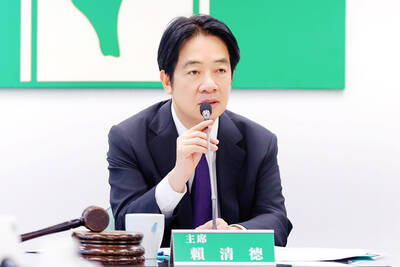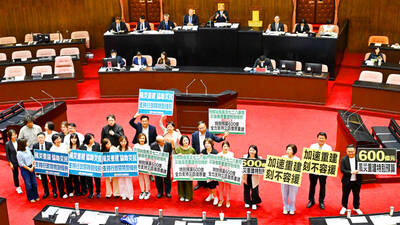China said yesterday it would soon open fresh talks with aides to the Dalai Lama in a response to fierce pressure from world leaders less than four months before Beijing hosts the Olympic Games.
The state-run news agency Xinhua said government officials would meet “in the coming days” with a private representative of the exiled Tibetan spiritual leader.
It would be the first known encounter between the two sides for a year.
The surprise announcement was immediately welcomed by a spokesman for the Dalai Lama as well as by the international community, with France, Japan and the EU and the US hailing the move as a step forward.
“In view of the requests repeatedly made by the Dalai side for resuming talks, the relevant department of the central government will have contact and consultation with Dalai’s private representative in the coming days,” Xinhua said.
A Dalai Lama spokesman called it “a step in the right direction.”
“Only face-to-face meetings can lead to a resolution of the Tibetan issue,” Tenzin Takla said.
The two sides resumed a long-dormant series of talks in late 2002 but they later broke off and the last known encounter between them was between June and July last year.
The official quoted by Xinhua said they hoped that through consultation, “the Dalai side will take credible moves to stop activities aimed at splitting China, stop plotting and inciting violence and stop disrupting and sabotaging the Beijing Olympic Games so as to create conditions for talks.”
Exiled Tibetan leaders say the Chinese crackdown last month left more than 150 people dead. Beijing insists it acted with restraint, killing no one, and blames Tibetan “rioters” for the deaths of 20 people.
Meanwhile, protesters yesterday waved the Tibetan flag and denounced China’s rulers as the Beijing Olympic torch came to Japan for the latest relay leg.
Japan, which is trying to repair uneasy ties with China, has promised tight security for the torch run today through the central mountain town of Nagano, the site of the 1998 Winter Olympics.
As torch-bearers rolled into Nagano, hundreds of Falun Gong supporters marched with a loud brass band through the city’s streets condemning China’s leadership, which considers the spiritual movement an “evil cult.”
“Stop the mass murder by the Chinese Communist Party,” read a banner held by marchers in yellow Falun Gong T-shirts, who were closely watched by police.
Separate protesters waved Tibetan flags, including at a highway rest area where the Chinese torch delegation stopped on its way to Nagano, 180km north of Tokyo.
In related developments, French supermarket chain Carrefour, accused by some Chinese of supporting the Dalai Lama, canceled a sales promotion planned for the May Day holiday, state media said yesterday.
“Carrefour has canceled the week’s advertising activities related to the promotion, including the print media, broadcast and circulars during the coming May Day holiday period,” Xinhua news agency quoted Carrefour media manager Chen Bo as saying.
“We estimate that sales over the May Day holiday will decrease 20 percent from previous years,” Chen said, without linking the drop to protests.
Last weekend, Chinese took to the streets in several cities to demand a boycott of French goods.

President William Lai (賴清德) yesterday criticized the nuclear energy referendum scheduled for Saturday next week, saying that holding the plebiscite before the government can conduct safety evaluations is a denial of the public’s right to make informed decisions. Lai, who is also the chairman of the Democratic Progressive Party (DPP), made the comments at the party’s Central Standing Committee meeting at its headquarters in Taipei. ‘NO’ “I will go to the ballot box on Saturday next week to cast a ‘no’ vote, as we all should do,” he said as he called on the public to reject the proposition to reactivate the decommissioned

US President Donald Trump on Friday said that Chinese President Xi Jinping (習近平) told him China would not invade Taiwan while Trump is in office. Trump made the remarks in an interview with Fox News, ahead of talks with Russian President Vladimir Putin over Moscow’s invasion of Ukraine. “I will tell you, you know, you have a very similar thing with President Xi of China and Taiwan, but I don’t believe there’s any way it’s going to happen as long as I’m here. We’ll see,” Trump said during an interview on Fox News’ Special Report. “He told me: ‘I will never do

The Legislative Yuan yesterday approved an aid and recovery package authorizing the government to allocate up to NT$60 billion (US$1.99 billion) for regions hit by Typhoon Danas and subsequent torrential rains last month. Proposed by the Executive Yuan on Aug. 7, the bill was passed swiftly after ruling and opposition lawmakers reached a consensus in inter-party talks on relief funding and assistance for disaster-stricken areas. The package increases the government’s spending cap from the originally proposed NT$56 billion to NT$60 billion, earmarked for repairing and rebuilding infrastructure, electricity systems, telecommunications and cable TV networks, cultural heritage sites and other public facilities.

FLEXIBLE FORCE: Only about 10 percent of small drones reach their target, an expert said, which is why it is important to make it easier to procure large numbers of drones The military is planning to recategorize military drones as “consumables/munitions,” rather than as aircraft, to speed up the procurement process, the army said yesterday. The Army Command Headquarters said the decision was made because drones, like munitions, need to be rapidly replaced, and thus should be categorized as consumables/munitions “to meet the army’s practical needs.” The headquarters’ confirmation came after the Chinese-language Liberty Times (the Taipei Times’ sister paper) early yesterday reported that the army was about to make the classification change based on the example of the US, which is Taiwan’s biggest arms provider. US Secretary of Defense Pete Hegseth announced a